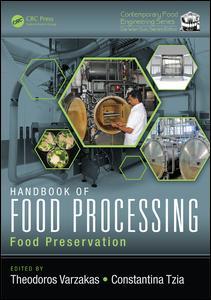Description
Handbook of Food Processing
Food Preservation
Contemporary Food Engineering Series
Coordinators: Varzakas Theodoros, Tzia Constantina
Language: English
Subject for Handbook of Food Processing:
Keywords
Shelf Life; microbial; Moisture Content; inactivation; HPP; heat; Microbial Inactivation; transfer; Decimal Reduction Time; ascorbic; Orange Juice; acid; Inactivation Rate Constant; ohmic; Hp Treatment; heating; Ohmic Heating; shelf; Microwave Heating; life; Retort Pouches; Water Vapor Permeability; Thermal Process; Pectin Methylesterase; PME; Double Seaming; Frozen Storage; Ohmic Heating System; Ohmic Heating Process; SPR Biosensor; Soy Protein; Constant Product Temperature; Electrochemical DNA Biosensor; Remaining Enzyme Activity; Table Top Sweeteners
· 17.8x25.4 cm · Hardback
Description
/li>Contents
/li>Biography
/li>
Packed with case studies and problem calculations, Handbook of Food Processing: Food Preservation presents the information necessary to design food processing operations and goes on to describe the equipment needed to carry them out in detail. The book covers every step in the sequence of converting raw material to the final product. It also discusses the most common food engineering unit operations and food preservation processes, such as blanching, pasteurization, chilling, and freezing to aseptic packaging, non-thermal food processing, and the use of biosensors.
Highlights Include
- Case study on the effect of blanching conditions on sulforaphane content in purple and roman cauliflower (brassica oleracea l. Var. Botrytis)
- Principles of thermal processing described along with thermal process calculations
- Case study on microwave preservation of fruit-based products: application to kiwifruit puree
- Principles and applications of Ohmic heating
- Advances in food additives and contaminants
- Use of edible films and coatings in fresh fruits and vegetables preservation
The book provides information regarding the common food preservation methods such as blanching, thermal processing of foods, canning, extrusion-cooking, drying or dehydration of foods, chilling, and freezing. It also describes the principles and applications of new thermal and non-thermal food processing technologies, i.e., microwave heating, ohmic heating, high pressure (HP) processing, pulsed electric field (PEF) processing, magnetic fields, ultrasound, use of edible films and coatings, food packaging-aseptic packaging, and modified atmosphere, biosensor and ozone applications. The book helps you keep up with diverse consumer demands and rapidly developing markets.
Blanching. Thermal Processing. Canning. Canning of Fishery Products. Extrusion – Cooking. Dehydration-Spray Drying-Freeze Drying. Chilling. Freezing. Microwave Heating. Microwave Heating Technology. Advances in Food Additives and Contaminants. Ohmic Heating: Principles and Application in Thermal Food Processing. High Pressure Process Design and Evaluation. High Pressure Processing of Foods: Technology and Applications. Pulsed Electric Fields. Ultrasonic and UV Disinfection of Food. Edible Coatings and Films to Preserve Quality of Fresh Fruits and Vegetables. Food Packaging – Aseptic Packaging. Modified Atmosphere Packaging of Fruits and Vegetables. Biosensors in Food Technology, Safety and Quality Control. Ozone Applications in Food Processing.
Theodoros Varzakas owns a Bachelor (Honours) in Microbiology and Biochemistry (1992), and a Ph.D. in Food Biotechnology and an MBA in Food from Reading University, UK (1998). He has also worked as a postdoctoral research staff at the same university. He has worked in large pharmaceutical and multinational food companies in Greece for 5 years and has also got at least 14 years experience in the public sector. Since 2005 he serves as Assistant and Associate Professor in the Department of Food Technology, Technological Educational Institute of Peloponnese (ex Kalamata), Greece specializing in issues of food technology, food processing, food quality and safety. Reviewer in many international journals such as (International Journal of Food Science & Technology, Journal of Food Engineering, Waste Management, Critical Reviews in Food Science and Nutrition, Italian Journal of Food Science, Journal of Food Processing and Preservation, Journal of Culinary Science and Technology, Journal of Agricultural and Food Chemistry, Journal of Food Quality, Food Chemistry, J. Food Science). Has written more than 90 research papers and reviews and has presented more than 90 papers and posters in national and international conferences. He has written two books in Greek, one on genetically modified food and another one on Quality control in food. He has edited a book on sweeteners which has been published in 2012 by CRC and another book on biosensors published by CRC in 2013.
Constantina Tzia, received a diploma in chemical engineering and a Ph.D in food engineering from the National Technical University of Athens, Greece in 1977 and 1987, respectively. His current research interests include quality and safety (HACCP) of foods, sensory evaluation, fats and oil, dairy and bakery technology, and utilization of food by-products. Professor Tzia’s work has been widely published and presented, appearing in prestigious publications such as the Journal of Food Scienc
These books may interest you

Operations in Food Refrigeration 117.69 €

Operations in Food Refrigeration 293.12 €


